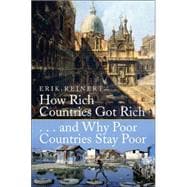
Note: Supplemental materials are not guaranteed with Rental or Used book purchases.
Purchase Benefits
What is included with this book?
| Foreword | p. vii |
| Acknowledgements | p. xi |
| List of Figures | p. xv |
| Introduction | p. xvii |
| Discovering Types of Economic Theories | p. 1 |
| The Evolution of the Two Different Approaches | p. 21 |
| Emulation: How Rich Countries Got Rich | p. 71 |
| Globalization: the Arguments in Favour are also the Arguments Against | p. 101 |
| Globalization and Primitivization: How the Poor Get Even Poorer | p. 165 |
| Explaining Away Failure: Red Herrings at the End of History | p. 203 |
| Palliative Economics: Why the Millennium Goals are a Bad Idea | p. 239 |
| 'Get the economic activities right', or, the Lost Art of Creating Middle-Income Countries | p. 271 |
| Appendices | |
| David Ricardo's Theory of Comparative Advantage in International Trade | p. 301 |
| Two Different Ways of Understanding the Economic World and the Wealth and Poverty of Nations | p. 305 |
| Frank Graham's Theory of Uneven Development | p. 309 |
| Two Ideal Types of Protectionism Compared | p. 311 |
| Philipp von Hornigk's Nine Points on How to Emulate the Rich Countries (1684) | p. 313 |
| The Quality Index of Economic Activities | p. 317 |
| Notes | p. 318 |
| Bibliography | p. 336 |
| Index | p. 357 |
| Table of Contents provided by Ingram. All Rights Reserved. |
The New copy of this book will include any supplemental materials advertised. Please check the title of the book to determine if it should include any access cards, study guides, lab manuals, CDs, etc.
The Used, Rental and eBook copies of this book are not guaranteed to include any supplemental materials. Typically, only the book itself is included. This is true even if the title states it includes any access cards, study guides, lab manuals, CDs, etc.